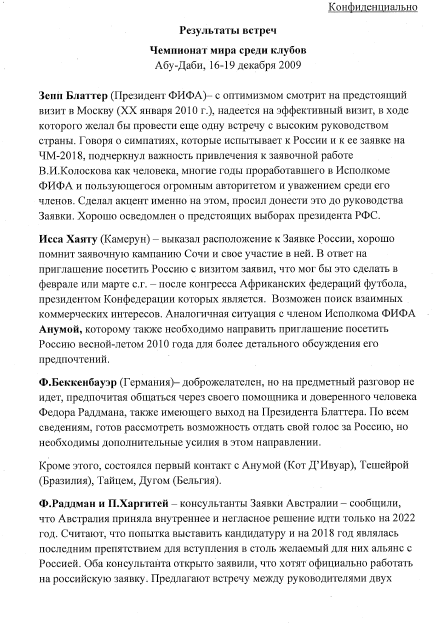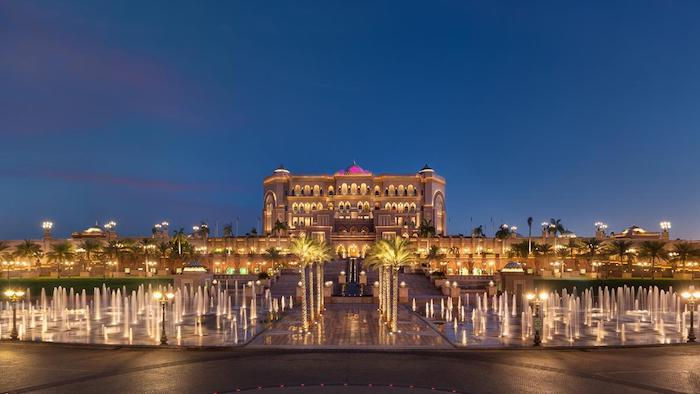Russian emails reveal winning World Cup bid strategies
- Bonita
- Nov 6, 2019
- 6 min read
Updated: Jan 5
Hacked Russian emails purport to reveal lobbying strategies, assessment of voters and possibility of collusion with Australia

Not that anyone in Australia would know it, but there’s been a bit of news in the past week or so in the German, Russian and English media that is relevant to Australia’s failed World Cup bid for 2022.
A Russian investigative website leaked some documents that purport to come from the email of an individual with a link to the Russian World Cup bid.
Keen students of the pathology of the World Cup bids may recall that the Russian bid was never properly investigated by anyone – including FIFA’s 21-month long investigation led by Michael J Garcia – because the Russians had used ‘borrowed’ computers and the organisation they borrowed the computers from had thrown them out when they were returned.

I’ve always thought that was one of the most hilarious excuses in the world, considering (a) they have Edward Snowden holed-up in Moscow who knows a thing or two about computers and how to get things from them, and (b) the Russians are not exactly backward themselves in this area – just ask Hillary Clinton and the US Democratic Party.
So from which unsuspecting Russian soul were these emails ripped? You may be two steps ahead of me, but none other than Sergey Kapkov, the head of the organisation who loaned the Russian bid team the computers. An organisation wholly funded by Roman Abramovich who, of course, is a good mate of Vladimir Putin’s and who was leaned upon by Putin to support the Russian bid financially.
When asked by media in the past week whether the emails were genuine or not, the former head of the Bid team (and the Russian World Cup), ex-FSB man and now FIFA Council member, Alexei Sorokin said “Nyet”. A little bit like when former Sports Minister Vitaly Mutko was asked whether Russia was involved in state-sanctioned doping, he also said “Nyet”.
Sorokin also said this week that “we have repeatedly answered all sorts of questions on this matter, including during the official investigation”. That is not so of course, not least because of the computers that had been destroyed that FIFA's ethics investigation accepted as a reason for precluding the Russians from responding to their investigation.
But I reckon that the documents are the real thing – and here’s why.
For a start, they are unerringly accurate in their summary of the 24 FIFA Executive Committee members at the time. For example:
Sepp Blatter: “Subtle, cunning and extremely diplomatic.”
Michel Platini: “Not a diplomat prone to harsh direct judgments.”
Jack Warner: “The most odious and scandalous member of the FIFA Executive Committee. He was involved in more than one scandal with bribes and speculation of tickets.”
The documents make it clear that the merits of the bid were irrelevant to the outcome, rather it's about the “personal relations” with members of the FIFA ExCo. It suggests that highly-placed consultants are required to act as intermediaries between bidders and the FIFA ExCo, and outlines the need for non-accountable, “extra-budgetary funds” to cover a range of costs. Sound familiar?
The Russian bid team also reports that they had meetings in Abu Dhabi in December 2009 with then FIFA voter Franz Beckenbauer, as well as the Australian consultants, Fedor Radmann and Peter Hargitay.
This meeting happened. It was while the Club World Cup was on, and Bid teams and FIFA ExCo were out in force in the lead-up to Christmas, staying at the spectacular FIFA-esque Emirates Palace Hotel.

The late Chuck Blazer was chucking wheelies in the palatial corridors on his mobility scooter while City Football Group officials looked on with a mixture of fascination and horror. Bidders spied on other bidders from behind large palm fronds (some of them fake) and an enormous, bejweled, Christmas tree. And other ExCo members present were grinning like a Cheshire cat at all the early Chrissie presents they were receiving from bidders eager to impress.
The major aim of attending the tournament from an Australian bid team perspective was to ‘talk to the Russians’.
And we did through Radmann – referred to by the Russians as Beckenbauer’s “trusted person” – and Hargitay. This is what the Russian bid team briefed their superiors.
“F. Raddman [sic] and P. Hargitay – Consultants for Application of Australia – reported that Australia made an internal and unspoken decision to go only to 2022. They believe that the attempt to run for 2018 was the last obstacle to enter into the alliance with Russia so desired for them. Both consultants openly stated that they want to officially work on the Russian application. They are proposing a meeting between the leaders of the two application committees … At the same time, they emphasize the extreme confidentiality of these discussions since any association of the declared countries contradicts the nomination rules established by FIFA.”
Not that it was all one way. In another document outlining their lobbying strategy, the Russians noted the need for:
”- the study of possible alliances – primarily with countries that have concentrated their efforts in 2022 (primarily with Australia). Develop a sound international business strategy. The key tasks in this direction are to split the votes of Europe and win the votes of Africa and South America.”
Radmann and Sorokin followed-up their Abu Dhabi meeting with another in Zurich in January 2010 where Radmann sought “speedy cooperation” of the arrangement discussed the previous month. Amongst other things, Radmann was also seeking payment of €3 million and another €1.5 million as a victory bonus.
This is a similar structure to the amounts promised to Radmann for his work with Australia (notwithstanding currency conversions) of $3.7 million for the base contract and $4 million for a win bonus. It was always assumed that part of Radmann's hefty payment was earmarked for FIFA voter, Franz Beckenbauer. The contract of Radmann's business partner, Andreas Abold, was $3.2 million. However, he was ultimately paid $10.07 million by Australia, giving the duo $13.7 million – actually $2.8 million more than they would have received based on their initial contracts with bonus!
Does any of this matter?
Most will say it doesn’t because it is almost nine years since the infamous vote of December 2010, and the World Cup in question is well and truly over – and was also highly successful. There is also no evidence to suggest that Russia made financial inducements to FIFA voters.
However, it does matter.
It matters because I have been saying for ten years that we were attempting to collude with Russia, which was specifically precluded in the bidding guidelines. I have documentary evidence as well as ‘being in the room’ to support this.
When it came to the 21-month investigation into the 2018/2022 bids, however, the then head of the FIFA Ethics Committee asked Sorokin and former FFA Chairman, Frank Lowy, whether it was the case that the two bids had sought to collude and they said “no”.
The Ethics Committee accepted this – just as they accepted it was impossible to find material from the Russian computers, and just as the sporting world accepted, at first, that Russia was not involved in state-sanctioned doping.
Despite the fact Lowy told Garcia it wasn’t true in 2014, he was nonetheless counting on Russia’s vote the night before the Bid outcome was known.
In his own documentary, Played, broadcast in 2015, he showed a contemporaneous account of counting the votes. I recount it in my book, Whatever It Takes – the Inside Story of the FIFA Way.
”‘Let’s go through it again,’ said Lowy.
Everyone around him swallowed a sigh. They had counted so many times. Not just in the 36 hours since the final presentation to FIFA’s elite, but in the past two years and even prior to that. No-one objected.
Ben picked up his scrap of paper and pen and ticked off the countries as Lowy spoke.
‘Germany. Cyprus. Switzerland. Belgium.’ Lowy paused.
‘There’s the big country to the north,’ said Ben. Everyone smiled as if taking comfort in a trusted partner.
Lowy continued. ‘Russia. This is the five basics that we’ve had most of the time. All along. There’s no doubt about this. Apparently we’re going to get two basic Africans.’
‘And the two Africans,’ echoed Ben.
‘That’s seven. If we get seven, we can’t lose,’ said Lowy.
In other words, Australia was counting on the votes of Franz Beckenbauer, Marios Lefkaritis, Sepp Blatter, Michel D’Hooghe, Vitaly Mutko, Jacques Anouma and Issa Hayatou in the first round alone. No wonder Lowy thought Australia couldn’t lose.”
Either Lowy and Buckley 'forgot' about Russia when they spoke with Garcia, or they made up the entire scene recounted above for television five years before it was broadcast.
It also matters because Australia and Australian football were not then, and are not now, prepared to say they got it so very wrong, and that is not how we do – or should do – things.
Worse than that, too many people in football are inured to it. Lies, bribes, money laundering, corruption, false accounting, extravagant gifts and favours, and collusion are just accepted ways of going about football business.
In the words of one prominent football identity in Australia: “(The) trouble is the corruption is just expected and there is simply no traction.”
Unfortunately, it's the truth. I've lived with it for almost ten years. But isn't it a sad, sad world we inhabit?